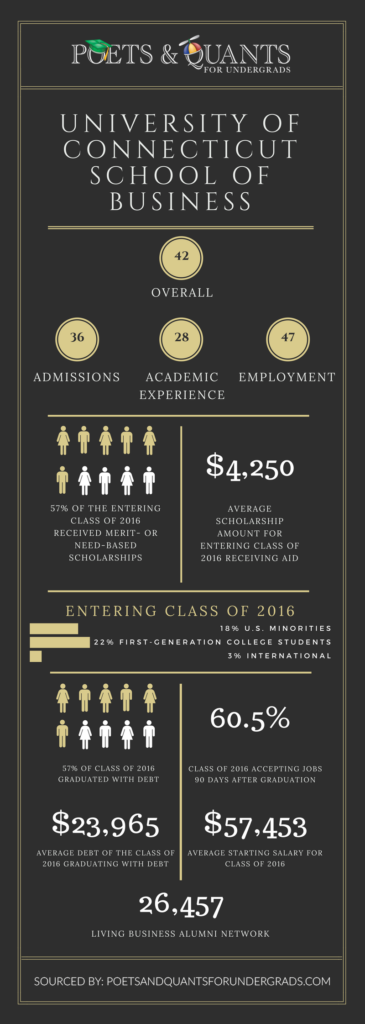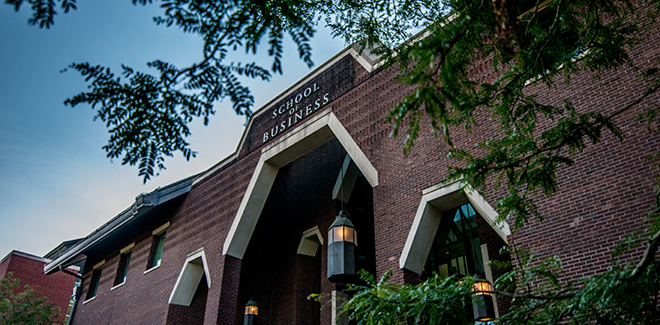 When Kimberly Jakabcin arrived as a freshman at the University of Connecticut School of Business in the fall of 2010, she was among the inaugural group of students at the school to live in the school’s then-new and experimental Business Connections Learning Community, a dormitory and learning community for incoming business majors.
When Kimberly Jakabcin arrived as a freshman at the University of Connecticut School of Business in the fall of 2010, she was among the inaugural group of students at the school to live in the school’s then-new and experimental Business Connections Learning Community, a dormitory and learning community for incoming business majors.
At first, Jakabcin was apprehensive about living in the building, but she soon came to realize what an asset it was to her as a business student. She engaged early on with alumni through class presentations and networking sessions geared towards students in the community. She got involved in the community’s marketing committee, participated in a Business Connections immersion trip to Germany and Prague, and turned to her fellow business students when she needed help with homework or preparing for an exam, lunch-time lectures on LinkedIn, late night study sessions in the dormitory lounge with her fellow business students and extra attention from professors helped make for a memorable first two years.
“I just think I gained a lot of leadership experience and professional experience form being in that environment as a freshman and sophomore,” she says. “It is really helpful because you are living in the same building as the kids you are taking classes with. It was just a great community to lean on other people for help.”
ADVANTAGEOUS GEOGRAPHY
The school’s Business Connections Learning Community, now in its sixth year, is one of the many things that help distinguish the University of Connecticut’s School of Business, ranked No. 42 in P&Q’s ranking of undergraduate business programs. The UConn campus, in the bucolic town of Storrs, Connecticut, has an advantageous location in the corporate corridor between Boston and New York, allowing the school to have strong relationships with many Fortune 500 companies. The school’s four-year business program draws many in-state students, who are drawn to the school’s strong business program, which has an emphasis on hands-on learning experiences and technology.
About 45% of applicants who apply to the business school gain admission, according to school data, and there were 751 undergraduate business majors who entered the school in the fall of 2016.
In the last few years, the school has made it a priority to be a campus that is cutting-edge and in tune with the latest business trends. For example, the school provides a digital edition of The Wall Street Journal daily to students’ computers, tablets or devices, one way the school helps develop students’ business literacy, administrators said. Students can now Bloomberg certified while at school and can use one of the 15 Bloomberg terminals spread throughout the Storrs and regional campuses. In addition, students can participate in one of several accelerators on campus that enhance experiential learning outside the classroom, including ones in Innovation, Experiential Learning and Sustainable Community Outreach and Public Engagement.
UCONN RATED HIGHLY FOR RECOMMENDING TO FRIEND AND WORTH ITS COST IN TIME AND TUITION
There have also been some curriculum tweaks in the last three years order to make the coursework for relevant for students, administrators said. For example, in 2014 the school redesigned its Business Analytics undergraduate major at its regional campuses. The school also introduced new minors for School of Business majors in Digital Marketing & Analytics, Professional Sales Leadership and Management.
Alumni from the class of 2014 who filled out the alumni survey said they would highly recommend the business program to a friend, and believed it was worth its time and money. Alums like Jakabcin also say they liked the flexibility of the curriculum, which allows them ample time to take electives in other areas of business that they’re interested in.
“There were a few mandatory classes I had to take in marketing, but I had a lot of flexibility to take other classes,” says Jakabcin, who now works in marketing at ASPCA. “I took a ton of real estate classes because that was something I was interested in, and I think I gained a lot from that experience.”
Alums also gave the school’s career services office relatively high marks on the survey. The school’s Undergraduate Career Development Office offers several branded programs that help students develop career readiness, including HuskyCareerPrep, which offers students an online suite of career tools, and HuskyCareerLink, a web-based recruiting system. Students can also take advantage of mentoring programs, professional development workshops, and the Diversity in Business Lecture series through the school’s Office of Diversity and Inclusion.
ORGANIZED ACCESS TO BIG FOUR ACCOUNTING FIRMS
UConn business students did well when it came to securing internships, with about 85% of the class of 2016 reporting that they’d had an internship while in college. It took them longer though to find jobs than many of their peers at the other schools in the ranking, with only 60.5% of the class of 2015 and 2016 securing jobs within three months of graduation. The average salary for the class of 2015 was $56,889 and $57,453 for the class of 2016.
Accounting majors at the school do especially well on the career front, with many securing jobs from the Big Four accounting firms. PricewaterhouseCoopers (PwC) is the largest employer of UConn business graduates, hiring 55 business majors from the class of 2016, followed by Deloitte, which hired 19 students.
Mathew Blake, an accounting major who graduated from the business school in 2014 and now works at PwC, says the school is in a sweet spot for students who want to gain exposure to the Big Four accounting firms. He also benefited from a one-credit networking class that all accounting major had to take, he says.
“The school has a formalized recruiting process between the Big Four and other smaller firms. You have access to firms right in Hartford, Boston and New York,” he says. “Having that exposure is invaluable and great for your career.”
‘I WOULDN’T TRADE MY EXPERIENCE FOR THE WORLD’
The school received its lowest scores from alums in the survey on the quality of teaching in business courses.
Attending Connecticut’s flagship public university’s business program comes with a hefty price tag, even for in-state students. The total four-year cost for tuition and university fees for in-state students graduating in 2016 was $69,864, and students had to pay an additional $49,744 in additional expenses for room and board and other items.
About 57% of UConn business students from the class of 2016 graduated with student debt, with the average student debt hovering around $23,965.
Jakabcin, the 2014 alum, said she had about $30,000 in student debt after graduating from UConn’s business school, but believes her education was well worth the time that sacrifice.
“I wouldn’t take back that experience or go to another state or local school because UConn was so worth it,” she says. “I wouldn’t trade my experience for the world.”
WHAT ALUMNI SAY
“BCLC Business Immersion trip to Munich, Germany, and Prague, Czech Republic – Very rewarding experience learning about business in European countries and experiencing the culture there as well. This trip was a highlight of my college experience.” – Recent Alumni
“Study Abroad business classes in Italy. Got out of comfort zone and received tremendous insight as to the various ways that other countries do business.” – Recent Alumni
“Seaweed Fertilizer development. Worked on developing a marketing campaign for it; identifying consumer population for it and niche markets.” – Recent Alumni
Where the Class of 2016 Went to Work:
PricewaterhouseCoopers (PwC): 55
Deloitte: 18
Ernst & Young (EY): 14
KPMG: 12
The Travelers Companies: 11
United Technologies Corporation (UTC): 11
The Hartford: 8
Bank of America: 8
Aetna: 7
Barnum Financial Group: 6










